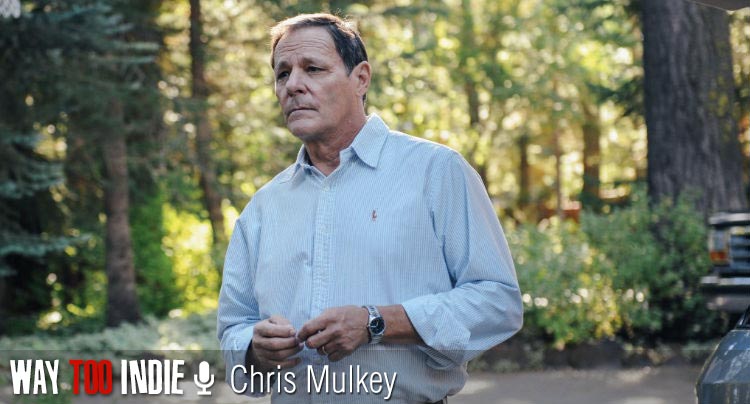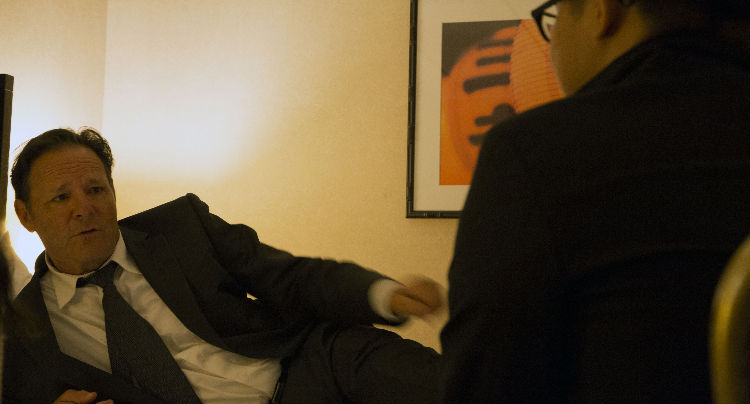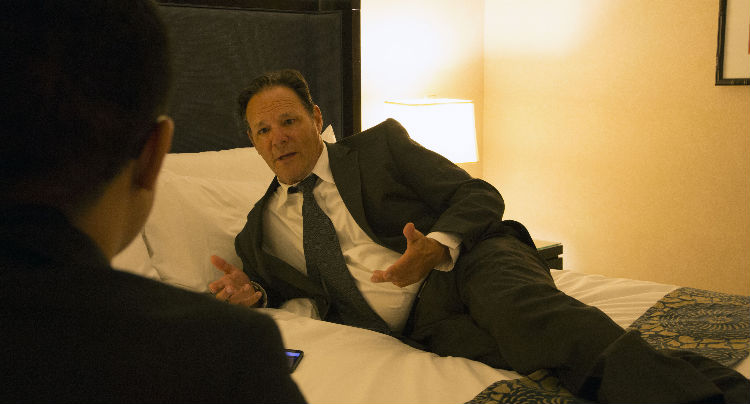Chris Mulkey Gets Comfy To Talk ‘Last Weekend’

A handful of siblings and their significant others gather at their wealthy parents’ home in Lake Tahoe for a weekend of awkward arguments, divulged dark secrets, and a couple of near-death experiences in Last Weekend, the debut feature by co-directors Tom Dolby and Tom Williams. The film stars Patricia Clarkson and Chris Mulkey as the parents, with the rest of the ensemble filled out by young stars on the rise: Zachary Booth (Damages), Joseph Cross (Lincoln), Alexia Rasmussen (Proxy), and Fran Kranz (Cabin in the Woods).
We spoke with Mulkey in a roundtable interview about working with Patricia, the talent of the film’s young cast, whether his on-screen marriage reflects his own, working with Dolby and Williams, shooting a love scene at the exact right time, and more.
Just as a preface, we interviewed Chris in a room at Hotel Kabuki in San Francisco. The setting was very…casual. Check out the images below and you’ll understand why this was the most amazing, epically sexy interview setup of all time.

Had you worked with Patricia Clarkson before?
Chris: No, but I like her work. It’s such a great match. You meet people and you go, “Oh this’ll work.” Like you guys. You guys walked in here and I was like, “I got you guys. It’s good.” Sometimes you walk into a place and you go, “Oh dude, this is so wrong.” You know what I mean? I think it’s magnetic electrical. I met Patty and Tom Williams and Tom Dolby, and I went, “Oh my god.”
In the film you play a couple that’s been married 35-40 years. What did you do to sort of ferment that relationship on set?
Chris: We talked about our love lives. I’ve been married for 32 years. We had a simpatico going. It was amazing. Patty and I had a ritual. She had a voluminous verbiage that she delivers with great acumen. The reason she delivered that well is because, every night when we wrapped, she would come up to me, put her little fingers together, and go, “Mulkey. After dinner. My place. Let’s go over the lines, please?” She’d learn ten more pages and we’d just run them and run them. Then we’d get on the set, and she was just…[makes some kind of spaceship noise]. There used to be a great TV show called “Soul Train”. Don Cornelius would come on. “Soul Traaaain!” Patty would get on set and it would be like “Soul Train”. She would smoke that stuff. Realistically, she wouldn’t smoke anything…but we did drink a lot of wine learning those lines.
You’ve been honing your craft for a long time. When you come onto a project with talented young actors like this one, do you make a conscious decision to impart knowledge?
Chris: Well, being an experienced actor, one of the things I try not to do is tell too many stories or anecdotes, because I appear to be the ancient sage on the hill. You know what I mean? All the actors in this film are super smart. I don’t have to say anything to them. Fran Kranz and I just finished shooting another film called The Living out in New York. We’d go back and forth, but these guys came fully loaded.
You were working with two directors. What was the division of labor like? What are they each like as directors?
Chris: In truth, it felt seamless. We never got to a point where there was a lot of indecision at all. Tom Dolby was the author of the piece, and Tom Williams was his editor, in a way. It was the originator and the shaper. I think that’s the term. They both worked on all the shots. I felt completely comfortable.

The family dynamics in the film are sometimes shockingly authentic. Do those dynamics reflect what you’ve experience in your own family?
Chris: The dynamic on screen was that…I think Malcolm was in the moment as far as time having gone on. He realized that he was nearing retirement and that the kids had grown. Things had freaking changed, right? Whereas, Celia hadn’t quite arrived there yet and still treated the boys as if they were in junior high school. Malcolm’s job was to wait for her to arrive patiently at that timeline. You do that with someone you really love, and they loved each other very much. Patty and I talked about that. A spouse gives another spouse a leash as far as how long they want to let them run with a certain assumption before they [talk to them about it]. Usually my wife gives me a long leash, and then she goes, “Honey, you’re done. You’re done. It’s been great, but no. That’s over now.” We did a Jane Martin play about the war in Iraq, and we did the world premiere in Minneapolis, took it to Los Angeles, and then took it to New York. On the third production we played husband and wife. We started this one particular scene, and I said, “Remember in Minneapolis and Los Angeles we did it this way.” And she said, “Honey, we’re in New York. We have a different cast. It’s a different show. Okay?” and I went, “Got it.”
That’s why you’re still married. [laughs]
Chris: It’s true. There’s that scene [in the movie] where Patty’s like, “I’ve had all these wrong assumptions about how things are with the kids!” She has that big moment, and we look at each other, and we start to kiss each other and make love. It’s at that moment that they come together, and she and I were always going, “How is that going to feel?” Luckily, when we shot it, to Tom’s credit, we shot it late in the movie. We shot that scene at exactly the right time in our relationship. We didn’t have to choreograph anything–we just knew it.
